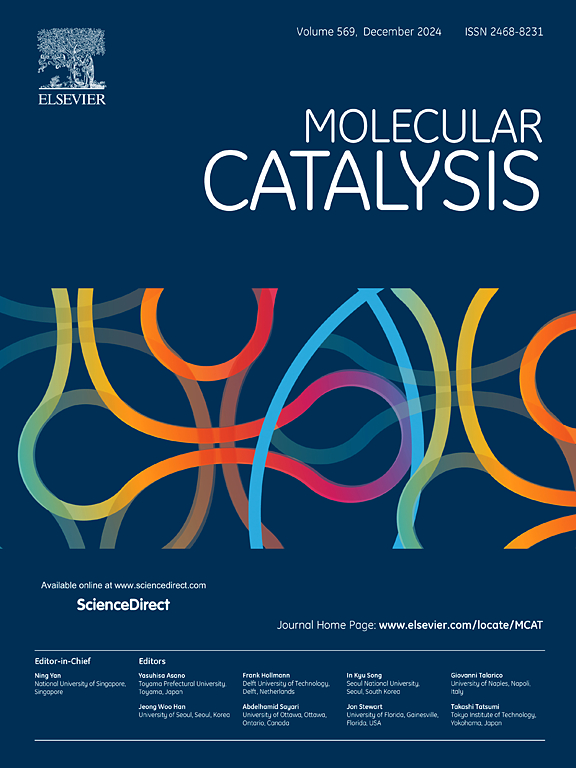通过不同底物支持的铑纳米团簇调制费托产物选择性- DFT研究
IF 4.9
2区 化学
Q2 CHEMISTRY, PHYSICAL
引用次数: 0
摘要
在费托合成(FTS)中,CO和H2通过铑基纳米催化剂高效地合成了碳氢化合物。不幸的是,如果小纳米团簇没有支撑在衬底上,则难以确定其构象(N≦20)。然而,铑纳米团簇在适当的载体上的催化活性会有很大的不同,因为团簇和载体之间的相互作用不同,这取决于相互作用是引起积极的还是消极的影响。因此,我们考察了Rh4纳米团簇在不同载体上的稳定性,并进一步探讨了载体对催化效果的影响。通过DFT计算研究了Rh4@supports(载体=石墨烯、ZSM-5和MCM-41)上Fischer-Tropsch合成中*CHx生成的反应机理。我们系统地研究了氢辅助解离*CHxO (x = 1,2,3)在Rh4@Graphene, Rh4@ZSM-5和Rh4@MCM-41上产生特定*CHx片段的选择性。此外,我们还通过自然键轨道(NBO)分析进一步分析了不同Rh4@supports对*CHx片段的选择性稳定作用。最后,我们希望通过仔细筛选合适的载体来改变Rh4纳米簇的活性,从而获得最佳的屏障,以帮助开发高选择性的FTS催化剂。本文章由计算机程序翻译,如有差异,请以英文原文为准。

Modulation of Fischer-Tropsch product selectivity via various substrates supported rhodium nanoclusters – A DFT study
CO and H2 have been used to synthesize hydrocarbons efficiently via Rh-based nanocatalysts in Fischer-Tropsch synthesis (FTS). Unfortunately, the conformations of the small nanoclusters (N ≦ 20) would be difficult to define if the clusters were not supported on a substrate. However, the catalytic activity of the Rh nanocluster on appropriate supports would differ appreciably because of the varied interactions between cluster and support, depending on whether the interactions induced a positive or negative effect. Therefore, we investigate the stability of Rh4 nanocluster on different supports and further discuss the influence of the support on the catalytic effect. The reaction mechanism of *CHx formation in Fischer-Tropsch synthesis on Rh4@supports (Supports = Graphene, ZSM-5 and MCM-41) is studied by DFT calculations. We systematically investigate the selectivity of the hydrogen-assisted dissociation of *CHxO (x = 1, 2, 3) on Rh4@Graphene, Rh4@ZSM-5 and Rh4@MCM-41 to generate specific *CHx fragments. In addition, we further analyze how the *CHx fragment is selectively stabilized by different Rh4@supports through natural bond orbital (NBO) analysis. Finally, we hope that an optimal barrier may be achieved by carefully screening the appropriate support to alter the activity of the Rh4 nanocluster to assist in developing a high selectivity FTS catalyst.
求助全文
通过发布文献求助,成功后即可免费获取论文全文。
去求助
来源期刊

Molecular Catalysis
Chemical Engineering-Process Chemistry and Technology
CiteScore
6.90
自引率
10.90%
发文量
700
审稿时长
40 days
期刊介绍:
Molecular Catalysis publishes full papers that are original, rigorous, and scholarly contributions examining the molecular and atomic aspects of catalytic activation and reaction mechanisms. The fields covered are:
Heterogeneous catalysis including immobilized molecular catalysts
Homogeneous catalysis including organocatalysis, organometallic catalysis and biocatalysis
Photo- and electrochemistry
Theoretical aspects of catalysis analyzed by computational methods
 求助内容:
求助内容: 应助结果提醒方式:
应助结果提醒方式:


